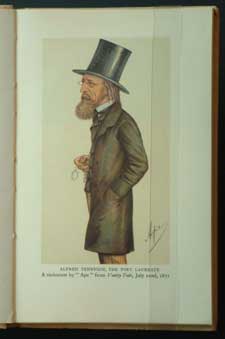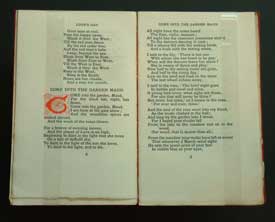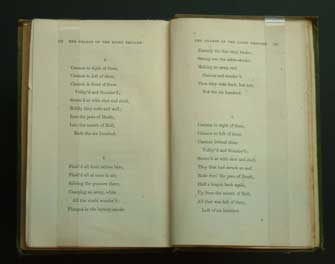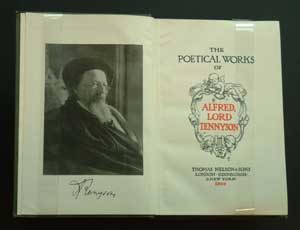
"£100 & a butt of sack yearly"
| Eusden & Cibber |
| Whitehead |
| Warton |
| Pye |
| Southey |
| Wordsworth |
| Tennyson |
| Austin & Bridges |
| Masefield |
| Lewis & Betjeman |
| Hughes & Motion |
| Refusals & Rejects |
Alfred Lord Tennyson |
|
|
View large (115 Kb) |
After Wordsworth died in 1850, there was talk of abolishing the post; some journals suggested a woman for the position, with the first choice being Elizabeth Barrett Browning. The poet's own choice was Leigh Hunt. And with generous spirit, Hunt himself wrote: 'if the Office in future is really to be bestowed on the highest degree of poetical merit, and on that only, then Mr Alfred Tennyson is entitled to it above any other man in the kingdom.' And so it was: Alfred Tennyson (1809-1892) was forty-one when he accepted the post. This caricature of him is by 'Ape' (Carlo Pelligrini), which first appeared in Vanity Fair, 22 July 1871. ___________________________________________________________ |
|
View large (162 Kb) |
After meeting Tennyson in London, Wordsworth wrote of him: 'He is decidedly the first of our living poets, and I hope will live to give the world still better things.' It was Tennyson's Poems, Chiefly Lyrical (1830) that established his reputation. Later published verse in 1833 and 1842 helped consolidate his position as an important English poet. In Memoriam, perhaps his most important work, appeared in 1850. As Laureate, of course, he received countless examples of bad verse from would-be Victorian poets. In defence he wrote: 'If any good soul would just by way of a diversion send me a good tome of prose!' Although Maud (1855) received some reader criticism, Tennyson's 'Come into the Garden Maud' remains one of his more memorable pieces. ___________________________________________________________
|
|
View large (91 Kb) |
When the Duke of Wellington died in 1852, Tennyson wrote an Ode that was published on the morning of the funeral (17 November). Tennyson took readily to producing such poems on national occasions, and often the result matched the mood or need of the moment. 'The Charge of the Light Brigade', a response to the 'glorious catastrophe' (W.H. Russell) at Balaclava on 25 October 1854, is but one example. Composed while sweeping up leaves, Tennyson dashed it off for publication in The Examiner (December 9th). Although his uncle was one who dubbed it 'horrid rubbish', it was extremely popular and was buoyed up by the atmosphere of war. ___________________________________________________________
|
|
View large (116 Kb) |
One aspect of Tennyson's laureateship set him apart from his predecessors: he was a friend of the monarch. He refused a baronetcy three times, eventually accepting one in the Spring of 1884. By then he was the most famous poet in the world, a larger than life national figure. He had 33 years of the post behind him and over his long life produced dozens of books. When he died on 6 October 1892, the whole nation mourned. He was the last truly great poet laureate. ___________________________________________________________ |



